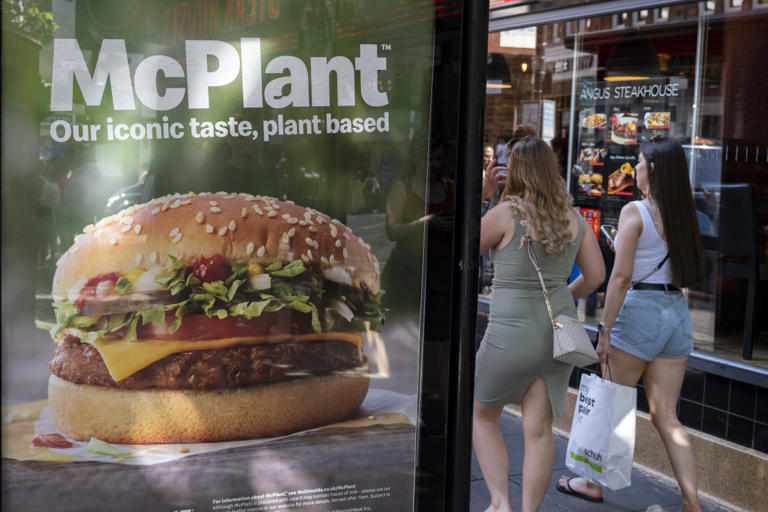McDonald’s (MCD) recently acknowledged that some of its once-promising trends are no longer successful. The fast-food giant has seen positive reception for its new $5 menu, launched on June 25, which offers customers a choice of a McChicken, four-piece chicken nuggets, or a McDouble, along with fries and a drink, for just $5. However, in contrast to this success, several plant-based menu items will not be making a return to U.S. restaurants due to lack of demand.
McDonald’s U.S. President Joe Erlinger confirmed during the WSJ Global Food Forum that salads and the McPlant burger, the latter developed in collaboration with Beyond Meat (BYND), will be discontinued in the U.S. market. Erlinger explained, “I don’t think the U.S. consumer is coming to McDonald’s looking for the McPlant or other plant-based proteins.”
The Rise and Fall of Plant-Based Meat
The plant-based meat trend gained significant traction in 2016 with the introduction of the Impossible Burger and Beyond Burger. These products were designed to mimic the look and taste of real beef, incorporating ingredients such as beans, soy, artificial flavors, and coconut oil. In 2021, McDonald’s partnered with Beyond Meat to create the McPlant burger, testing it in various locations across Louisiana, California, Texas, and Iowa.
Despite initial enthusiasm, consumer interest in plant-based meat has waned in recent years. A report by market research company Mintel indicated that the plant-based meat market in the U.S. shrank by 3.6% year-on-year in 2023. The report suggests that the decline in sales is linked to economic challenges, with consumers gravitating towards more affordable dietary choices and avoiding unfamiliar products during financial instability.
Health Concerns and Market Shifts
Health concerns have also contributed to the declining popularity of plant-based meats. Critics argue that these products are “ultra-processed” and lack essential vitamins such as zinc, potassium, and magnesium, which are more prevalent in real meat. Frank Hu, a professor at the Harvard T.H. Chan School of Public Health, has highlighted that some plant-based products, despite their high protein content, may contain unhealthy ingredients like high levels of sodium or unhealthy fats. He noted, “Being plant-based doesn’t necessarily mean it’s healthier.”
In response to the declining demand, some start-ups in the plant-based meat industry are exploring new strategies to attract consumers. According to a report from The Washington Post, companies are experimenting with mixing animal fat into plant-based ingredients to enhance taste, prioritizing flavor over sustainability.
McDonald’s Strategy Amidst Changing Consumer Preferences
McDonald’s decision to remove plant-based items from its U.S. menu reflects broader market trends and consumer preferences. The fast-food chain’s focus on its $5 menu, which offers traditional fast-food items at a lower price point, aligns with the current economic climate where affordability is a significant concern for many consumers. This move is part of McDonald’s strategy to lure back cost-conscious customers and maintain its competitive edge in the fast-food industry.
Broader Implications for the Plant-Based Meat Industry
The challenges faced by McDonald’s with its plant-based offerings highlight the broader difficulties within the plant-based meat industry. Despite the initial hype and investment, the sector is struggling to maintain consumer interest and achieve widespread adoption. Economic factors, health concerns, and taste preferences continue to be significant barriers.
Furthermore, the plant-based meat market’s contraction could have implications for start-ups and established companies in the industry. The need to innovate and adapt is more critical than ever, with some companies considering hybrid products that combine plant-based ingredients with animal fat to improve taste and appeal.
Conclusion
McDonald’s recent experience with its plant-based menu items underscores the complex dynamics at play in the food industry. While there was initial enthusiasm for plant-based meats, various factors, including economic pressures, health concerns, and taste preferences, have led to a decline in consumer interest. As McDonald’s shifts its focus to more traditional and affordable menu items, the plant-based meat industry must continue to evolve and adapt to changing market conditions. This situation serves as a reminder of the challenges and opportunities that come with introducing new food products in a competitive and ever-changing market.
